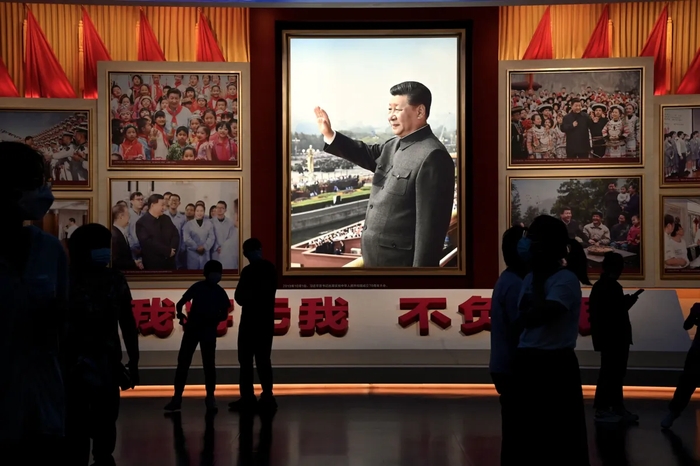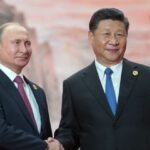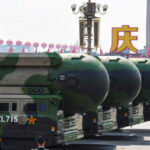By Justin Zhang and Lynn Xu
Chinese Communist Party (CCP) leader Xi Jinping warned in early July that if communist party members lose their belief in Marxism and communism the CCP will collapse and disintegrate, suffering the same fate as the Soviet Union.
On July 4, Mr. Xi told the state members at the Shanghai Cooperation Organization (SCO) summit by video connection that he opposes any country “instigating color revolutions” and “interfering in internal affairs” for any reason.
The color revolutions refer to a series of non-violent protests that occurred in the post-Soviet states and Serbia during the early 21st century, which eventually freed many Eastern European countries from communist Soviet rule.
“We will take the future and destiny of our country’s development and progress firmly into our own hands,” Mr. Xi said, making his efforts to unite Russia, Iran, and other SCO members to fight against the U.S.-led Western forces.
The authoritarian’s words exposed his concern that communist China would follow in the footsteps of the Soviet Union’s collapse in light of the influence of Western democracy and more and more Chinese people rejecting communist rule.
Public outrage with the CCP reached its peak at the end of 2022 after years of lockdown and harsh Zero-COVID policies, the country suffered huge losses in the economy, and people’s livelihoods suffered. On Nov. 24, 2022, a fatal fire in a sealed building in Urumqi, Xinjiang, caused casualties, triggering a “white paper” revolution against the authorities’ harsh Zero-COVID policies in China and outside China with some protesters shouting, “Take down the CCP!” “Take down Xi Jinping!”
July 1 this year is the 102nd anniversary of the founding of the CCP, which has seen 415 million Chinese people worldwide publicly withdraw from the CCP’s organizations—a global movement that began in November 2004 and has recently seen an average of 40,000 to 50,000 people daily renouncing the CCP.
While the number of official party members is not that high the movement to quit the CCP is not concerned with the number of official members, it is concerned with the Chinese people who have given an oath to the CCP, and this involves almost everyone who has grown up in mainland China. To renounce the CCP is actually to renounce the oaths that an individual has given to the CCP, as people are forced to do when they join the Communist Party, the Communist Youth League, or the Young Pioneers as children in elementary school.
“The CCP regime is like sitting on a powder keg, and the awareness of the ‘crisis of the death of the party’ is pervasive within the party,” said Yi Rong, chairwoman of the Global Service Center for Quitting the CCP, to The Epoch Times on July 1.
Communist Doctrine and One-Party Rule
Since last year, Mr. Xi and the mouthpiece media have issued several warnings about the fate of the communist party, blaming the root cause of the collapse of the Soviet Union on the communist party’s “relaxation of party leadership and communist ideological work.”
In a June 30 article, Qiushi, a CCP party magazine, quoted Mr. Xi’s speech on March 1 at a training class for young cadres at the Central Party School as saying that the CCP would be disintegrated as suddenly as the Soviet Communist Party if the CCP cadres lose their belief in “Marxism and communism,” and “socialism with Chinese characteristics.”
Mr. Xi attempted to eradicate internal corruption that has jeopardized the party’s survival by tightening the so-called party members’ belief in communism. However, in fact, communism is only a synonym for power, Guo Jun, editor-in-chief of the Hong Kong Epoch Times, said in the Elite Forum, a financial and political commentary program, that the CCP is obsessed with power, not some ideological idealism.
“To the CCP, capitalism can be fine, but freedom must be eliminated, and the communist party won’t tolerate anything that distracts or shares the power of society.
“In the CCP, power is the highest principle, and everything else must give way to this supreme goal. For the sake of absolute monopolization and absolute control of social power, the CCP can kill people and destroy the nation’s economy.” Ms. Guo said.
In addition, Mr. Xi’s high degree of centralization has accelerated the build-up of political risk, making him a target both at home and abroad, Li Yanming, a China current affairs observer, told The Epoch Times.
Mr. Li noted that the Chinese communist regime is now in an internal and external quagmire: it faces a siege by the international community led by the United States. Meanwhile, China’s economic, demographic, and social crises are compounding one another, which may lead to substantial social change at any time.
“Chinese society is brewing giant changes, and the regime’s collapse is imminent,” Mr. Li said.
Communist China vs. Post-Soviet Union
Comparing the 415 million who quit the CCP—including its three organizations of the party, the youth league, and the young pioneers—there were 5 million who quit the Soviet Communist Party (SCP) before its dissolution in December 1991, Ms. Guo said.
At that time, the Soviet Union still had a four million-strong army with powerful naval, air, land, and nuclear forces. But when the Soviet Union was dissolved, the army refused to carry out the orders of the Soviet Communist Party’s oligarchs in suppressing people; in Ms. Guo’s view, this contributed to a smooth transition to democratic government in the former member states of the Soviet Union.
A common feature of either SCP or CCP is that the communist regime is precarious, rife with various splits and internal contradictions; In such an environment, the forces of freedom would grow and eventually lead to the end of the communist system: “the disintegration of the former Soviet Union and the fall of the former communist regimes in Eastern Europe have validated this process,” Ms. Guo said.
While in China, Ms. Guo pointed out that since the oligarchic era of ex-leaders of the CCP Deng Xiaoping and Jiang Zemin, free forces emerged around the nation, “The CCP has faced two choices: one is to disintegrate, that is to say, to cede power and the communist party to step down; The other is to return to the stage of personal leadership and authoritarianism.”
Unfortunately, “What we’re seeing now in mainland China is that Xi Jinping is trying to restore the individual leader’s Maoist dictatorship, which is an inevitable part of the CCP system,” said Ms. Guo, adding that it is likely the current path of North Korea, “The cost is that the Chinese people are deprived of their freedom, society once again fell back into a state of closure.”
Ellen Wan contributed to this article.






